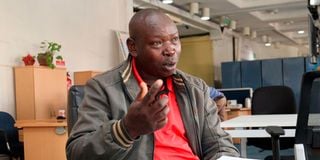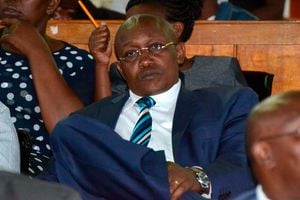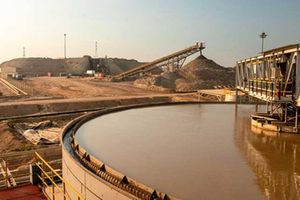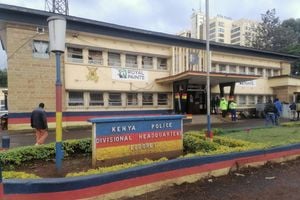
Thomas Obure who lost Sh336,900 he had saved in Ekeza Sacco while working in South Africa speaks during an interview at Nation Centre on February 27, 2024.
Ten years ago, Thomas Ondabu Obure was struggling to find a permanent job that could put food on the table for his young family.
Obure latched onto a friend’s idea to travel to South Africa, work and sustain his family, while saving enough capital to set up a business.
After his tourist visa was rejected, Obure chose to sneak into South Africa.
The plan was to get into South Africa through a group of Kenyans who were returning to Cape Town after the December 2013 festivities.
After a three-day drive through Tanzania, Zambia and Zimbabwe, Obure paid a motorcycle rider at the Beitbridge border post to smuggle him into South Africa.
The plan worked.
“I went with them in January 2014. Getting past Tanzania, Zambia and Zimbabwe was easy. Getting into South Africa was not. There are some unmanned parts of the border that you are smuggled through. You pay the traffickers to get you in, then meet up with the vehicle ahead. It’s a two-hour bike ride. You go through thickets, cross a river and then get to the highway,” Obure told the Nation in an interview.
The then 33-year-old Obure took to Cape Town like a fish in water. Within a few weeks, he had secured a sales job in a shop owned by another Kenyan.
But the salary was barely enough to survive in Cape Town, let alone send money back home and start saving capital.
“In South Africa life was hard, but when I would remember where I came from and what took me there, I would endure. At least I was earning. But life was hard.
"Many South Africans are not friendly to foreigners. With food, there are very few vegetable options. Mostly just meat, broiler chicken. In Kenya at least we have sukuma wiki, ‘managu’, and ‘saget’. In the winter it’s very cold. In August, it gets extremely windy for at least two months,” the 43-year-old said.
“I lived in a rental unit, made out of iron sheets. I would pay 400 Rand each month. In Kenya I had lived in Kawangware a long time ago, so I was already accustomed to such quarters. To save money, you had to endure such,” he added.
Obure quit the sales job and opted to become a cobbler, first setting up with just one stool in the middle of a street in Hermanus, within Cape Town.
He was now making more money, but could not bank it. The necessary documents to go around know-your-client laws could not be granted to illegal immigrants.
And that’s where Ekeza Sacco came into play.
His former boss and another Kenyan mentioned Ekeza Sacco, where he could save money and then borrow up to three times his deposits.

Thomas Obure during an interview at Nation Centre on February 27, 2024.
“After six months I had saved up enough to put up a small shop made from iron sheets because of the hostile weather — rain and strong winds. We were there illegally so we could not obtain the necessary documents to help us open bank accounts. I would keep my money under my mattress,” Obure said.
“They gave me Ekeza Sacco contacts for the Yala Towers branch in Nairobi. I called them (Ekeza) and they asked for a copy of my ID, which I duly sent. They set up my account and, later told me to collect my documents. I sent my brother, George, who lives in Gachie, Nairobi to collect a booklet and other documents related to my account,” he said.
Obure would send money from South Africa to his brother’s mobile money wallet which he deposited in his Ekeza account. Each deposit would be recorded in Obure’s passbook, and a receipt issued to his brother.
After two years of saving, Obure felt it was time to come back home, borrow Sh1 million from Ekeza Sacco and buy a matatu.
His Sh336,940 savings would stand in as security. Obure called Ekeza Sacco and was given an assurance that after filling in an application form, he would receive the Sh1 million loan.
“…After all, I had gone to South Africa to look for capital. When here I would constantly lose driving jobs and thought that I could thrive if I had my own vehicle. My friends in Mombasa who own matatus told me they net roughly Sh3,000 each day.
"I did the math with my Sh336,940 savings and found that I qualified for a Sh1 million loan. I called a friend in Mombasa who told me that with between Sh500,000 and Sh700,000 I could buy a Nissan Caravan in good condition. I had a lot of hope with Ekeza,” Obure recounts.
But on arriving in Kenya, the sacco had already imploded, triggered by what the Directorate of Criminal Investigations (DCI) officers insist was fraud by its founder — televangelist and politician, David Kariuki Ngari, who is better known as Gakuyo.
Gakuyo was to be prosecuted in 2018 for allegedly defrauding over 50,000 sacco depositors of more than Sh1 billion. But he reached an agreement with the complainants to refund their money.
Obure returned to Kenya in October, 2018 — five months after Gakuyo made public a five-phase plan to refund Ekeza Sacco members’ deposits.
At first, sacco officials told Obure to wait for two weeks before applying for the loan. He went back to Kisii County, where he was staying, waited. But nobody communicated after the two weeks lapsed.
His phone calls to the sacco went unanswered, and he decided to travel to Nairobi again to find out what was happening.
Officials at the Yala Towers office told Obure the loan scheme had been stopped on account of the legal troubles surrounding the sacco and its founder.
He was, however, given the option of withdrawing his deposits, which would be released 60 days after filling in a form.
Nearly six years later, there is no refund.
In 2022, Obure visited Ekeza Sacco’s Thika branch and was told he could get a piece of land in Nakuru as compensation.
If the land’s value exceeded the amount saved, Obure would top up before the transfer was completed.
Much like the earlier promise to refund his savings, no land has been transferred to Obure.
On Tuesday, Obure was among hundreds of Ekeza Sacco depositors who reported to the DCI headquarters along Kiambu road in Nairobi to record statements.
A 2017 audit by the Commissioner of Cooperatives revealed that over Sh1 billion had been transferred from Ekeza Sacco to companies owned or controlled by Gakuyo. The DCI then opened a probe into the matter.
Detectives believe that Gakuyo used the money to fund his lifestyle and boost a company he owns — Gakuyo Real Estate.
One of the most prime assets associated with Gakuyo, a 250-acre land in Murang’a County, has also been frozen by the Assets Recovery Agency (ARA).
The land is registered to Chosen Builders, which Gakuyo owns. It was initially 300 acres, but the government acquired a 50-acre portion after paying Chosen Builders Sh135 million.
The 50-acre portion is being developed into a landfill, in a project backed by the World Bank.
Gakuyo is currently at Industrial Area Remand Prison, after failing to raise Sh10 million cash bail that the Milimani Chief Magistrate’s Court gave him.
On February 26, he was charged with conspiring to defraud members of the public over Sh1 billion. He denied the 12 counts.










